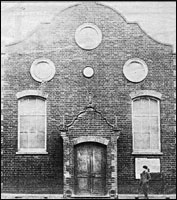![]()
The contents on this page remain on our website for informational purposes only.
Content on this page will not be reviewed or updated.
 |
|
 |
|
|
||||
|
Religion in 1887
|
||||
|
||||
|
Sunday Citizen March 17, 2002
The year 1887 found Fenny Stratford townsfolk going about their daily business in a God fearing and well ordered community, excepting a few interesting hiccups. Among unusual goings on was the local trader who sold up and 'did a runner', having been over familiar with his lady assistant. Otherwise the population seemed industrious and church going - even marriage - was viewed much as commitment, rather than transient as it is for some today. In religious affairs, for the local non-conformists it was a time of much hope and building for the future and towards reducing the debt on their chapel. The Primitive Methodists had given a public tea in their chapel on Christmas Day 1886 with the whole event raising 'a good sum.' This possibly also provided financial assistance towards the chapel enlargement which opened in October. Also in a fund raising mood were the Baptists, who also held a public tea. Followed by a sale of 'useful and fancy articles' this event again enjoyed a good attendance, concluding with a magic lantern show, held in the evening by Mr Daniels. Elsewhere in the town the Salvation Army were pursuing grandiose plans. A meeting of the Fenny Stratford Parochial Authority gave final acceptance to the building of the Salvation Army barracks, in Church Street.Tartly remarking upon the decision Mr Baisley commented that the sooner they got out of the town hall and into the barracks the better! These also were the sentiments of one 'Mr Angry' from the town who indignantly declared that while going along Aylesbury Street, one Sunday evening, he had encountered a group of youths, bawling the latest Salvation Army offering at the top of their voices, having learnt this particular ditty at that evening's Salvation Army service. The rendition left him decidedly unimpressed. He likened it to a row to which 'one is accustomed to hearing the tap room of a public house'! Hopefully more acceptable was The Christian Union, for 'Here young gentlemen and ladies receive such training as shall fit them for the stern duties of active life.' For those of whom these 'stern duties' had proved too great a burden, however, perhaps Underwoods Charity, founded in 1793, offered a measure of relief. The Baptists were certainly on a financial 'roll', which now enabled them to pursue their ambitions of constructing a new chapel. Indeed, as the Reverend C.H Spurgeon himself observed: They have enjoyed considerable prosperity and need a fit building to meet in." Apart from attending their own particular needs, in the wider community the varied religious entities were also preparing to play their role within the realms of education. In the Wesleyan schoolroom a sizeable meeting of the town's non-conformists met, to select the candidates and arrange affairs in connection with the forthcoming School Board. Yet, as has been touched upon in a previous article, that is another story! |
||||
|
|
||||
|
|
||||


